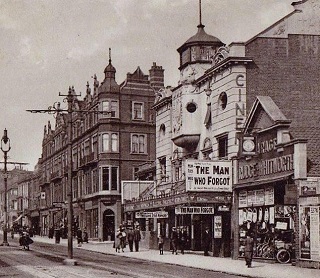Cranmer House (CC-95-223)

The Norvic, Norwich (uploaded by Mike_Blakemore) Creative Commons (Attribution) License via cinematreasures.org
In Autumn 1995, Cinema Culture in 1930s Britain contacted Cranmer House care home in Fakenham, Norfolk, seeking potential participants in the project; and between October that year and the following May five interviews were conducted there. On 24 October 1995, two group interviews took place: in the morning with four residents and in the afternoon with another three. Participants in the morning session were Jack and Rose Smith, Fred Barnes, born 1901, a retired farm worker, and Bert (surname unrecorded, born 1921), with a carer present. In the afternoon, Hilda Bennett was interviewed along with Mabel Manning and Alice [Marchbank?]. On 21 November 1995, Jack Smith and Hilda Bennett gave separate solo interviews; and on 2 May 1996, Jack and Rose Smith were interviewed together. All the interviews took place at Cranmer House.
While none of those taking part in the morning interview on 24 October claim to have been regular cinemagoers, they jog each other's memories, naming several cinemas in Norwich and also mentioning the names of music hall artistes and radio personalities who made films--these include Jack Hulbert and Cicely Courtneidge, who were particular favourites of Jack Smith's. Mr Smith recalls that his main interests were cricket and football, and he says he would only go to the pictures when there was nothing else to do; while Mrs Smith says she rarely went because she grew up in a rural area "miles from anywhere". The film Mandy, which the couple saw together, had made a great impression on them, and is mentioned more than once. The interviewer shows some photographs of stars, and this elicits further memories. The participants offer vivid recollections of earlier entertainments such as crystal radio sets and street musicians, the latter prompting reminiscences of old-time street traders--knife grinders, barrel organ players, rag-and-bone men, and the like. Conversation between the participants in the afternoon interview opens with reflections on the kinds of films they liked, with cowboys, musicals, and gangsters agreed favourites. They also enjoyed comedies--Laurel and Hardy rather than George Formby, who according to Alice could "Go too far with his jokes." As to star preferences, the elegant fashions and outstanding dance moves on show in Astaire and Rogers films are referred to a number of times. Not claiming to be avid cinemagoers ("There was nothing else to do"), the interviewees--all three of whom had gone into domestic service on leaving school, and probably had little free time--recall weekly Saturday trips to the pictures in the nearest town, Wells next the Sea. They remember cinemas as busy, noisy places, where you might--at the risk of adult disapproval--secretly meet up with boyfriends. Noting that the older generation was very strict when they were young-- at a time, they maintain, when the streets were safe and front doors could be left unlocked--they lament today's lack of discipline--while at the same time expressing approval of the fact that schools have become far more relaxed places for children.Documents, Memorabilia and Related Links
East Anglia home pageThe Hippodrome, Norwich (cinematreasures site)
'Do you remember these Norwich Cinemas' (Eastern Daily Press site)
Harry Lauder singing 'Keep Right On To The End of the Road', 1926 (YouTube)